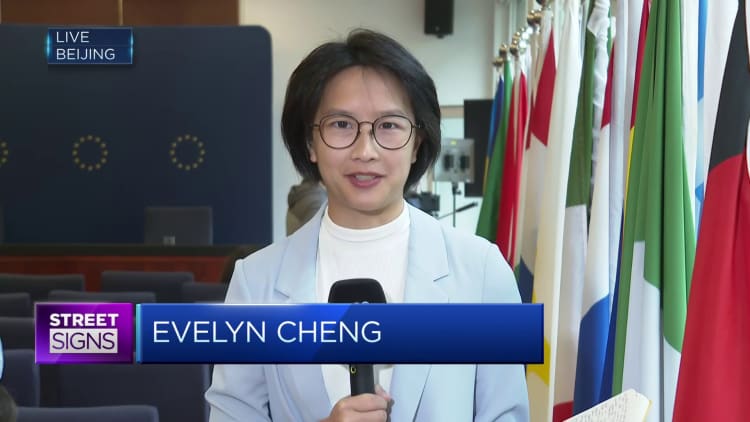The vehicles are scheduled to be shipped to Europe, at the Port of Taicang on December 19, 2022, in Suzhou, China.
VCG | China Optical Group | Getty Images
The European Union would need to impose higher-than-expected tariffs of up to 55% on Chinese electric cars to limit their imports into the bloc, according to new analysis by Rhodium Group.
The findings, released on Monday, come amid an ongoing EU investigation into anti-subsidies in electric vehicle imports from China.
Rhodium Group, which expects the EU to impose tariffs of between 15% and 30% on Chinese electric vehicles, said such tariffs are unlikely to be enough to check competition from China.
“Even if duties were at the upper end of this range, some China-based producers would still be able to achieve comfortable profit margins on the cars they export to Europe due to their significant cost advantages,” the report said.
Chinese companies such as BYD, which dethroned Tesla to become the world's largest electric car maker last year, can sell cars at much higher rates and profit margins in regions such as the European Union than in the domestic market, despite paying a 10% tariff rate. Chinese electric car makers are locked in an intense price war in their home market.
Rhodium said BYD's Seal U model, which sells for 20,500 euros in China and 42,000 euros in the European Union, makes a profit of 1,300 euros in its home market compared to 14,300 euros per car in Europe. She added that even after a 30% tariff increase, a company like BYD would achieve higher profits in the EU.
BYD will likely need to lower prices to achieve its goals of gaining more market share in the EU, the report said. However, a tariff rate of 30% would leave enough room to do so.
“Stricter tariffs of around 45%, or even 55% on highly competitive producers such as BYD, may be necessary to make exports to the European market unattractive for trade reasons,” the report said.
Investigation in the European Union
The European Commission, the EU's executive arm, launched an investigation into Chinese electric cars and government subsidies last year, with officials saying a flood of cheap cars threatened local producers.
According to some experts, incentives implemented in China in early 2010 led to an increase in the number of startups and increased battery cell capacity in the country, paving the way for globally competitive and affordable electric vehicles.
Chinese electric vehicle makers are already facing resistance from the United States amid high tariffs and political opposition, making the European market even more important for companies like BYD seeking global expansion.


Electric vehicles from Chinese companies are expected to make up 11% of the EU market in 2024 and could reach 20% by 2027, according to an analysis by the European Union for Transport and Environment.
When cars made in China from non-Chinese companies are included, the number is expected to exceed 25% this year.
Imports of electric vehicles from non-Chinese companies could also fall under EU subsidy investigations, with Rhodium estimating that tariffs at a level of 15%-30% could wipe out the business of foreign players like BMW or Tesla that ship cars from China.
In response to policy risks, electric vehicle makers have been working to move manufacturing to Europe. BYD plans to build a factory in Hungary.
However, Rhodium adds that Brussels could use other means to protect Europe's electric vehicle industry, such as restricting Chinese imports on national security grounds or increasing consumer support for EU-made vehicles.
The Chinese government has criticized the EU investigation into the subsidies as “blatant protectionism”, saying its companies are simply more competitive than their Western counterparts.
